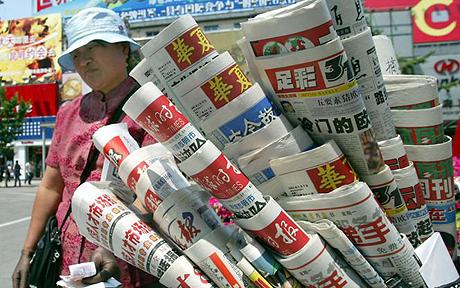In recent years, amid an ongoing tightening of the media environment and a government campaign to urge news outlets to “speak for the Party,” young reporters are increasingly turning away from a career in the field. Others who have been sidelined or chosen not to work in the mainstream media are using more independent channels to continue their work. In a report published on inmediahk.net and translated by Global Voices, Ip Iam Chong writes that many of China’s professional journalists are turning to social media and other less-restrained forums to report on issues that are restricted in the traditional media:
As propaganda authorities have become increasingly unreasonable and numerous journalists have received jail time for doing journalistic work, more and more professional journalists have either abandoned or transformed their careers. While some have moved into management positions at major online news portals, others have left media outlets and started writing and distributing independent investigative reports by making use of social media.
Although the people in the latter group are journalists by training and by trade, they are do not fit China’s legal framework for what constitutes a journalist. Indeed, it is illegal for a person to identify as a journalist if he or she does not hold a press card. All journalists must hold a press identity card issued by registered media outlets, otherwise it is illegal for them to call themselves journalists. The press card must be renewed annually by the journalist’s work unit or it will expire.
[…] Independent journalists have no institutional protection. The censorship system within media outlets is a form of control, but it also protects journalists from touching sensitive issues that can get them into trouble. The bureaucratic structure makes certain that responsibility is shared at all levels — editors and management staff work to ensure that news coverage will not break local laws or offend state or party officials. This minimizes the part that the journalists have to take on their shoulders.
[…] The growth of the independent journalism sector depends on individual courage, but it has also benefited from developing media and communication ecologies. More and more, breaking news circulates first via social media. Similar to other parts of the world, the conventional media sector is withering in the face of competition from online media — this may be even more pronounced in China, where censorship practices have made state-affiliated media increasingly rigid in recent years. [Source]
For Chinadialogue, environmental reporter Liu Jianqiang argues that despite deteriorating conditions for the media in China, investigative journalists are still able to find ways to fulfill their professional duties in times of emergency, such as after last year’s chemical explosion outside Tianjin:
It’s a common view that standards in mainstream Chinese journalism have been deteriorating for some time now. But when disaster strikes – for example, as in the Tianijn explosions – it is not just firefighters rushing towards the scene. Journalists follow close behind. The public know that their most reliable source of information during these fast moving events are the reports filed from the scene by professional reporters.
China’s news industry has seen huge changes in the past several years, and even the most optimistic of observers admit these have not been for the better. Commercial and political challenges have hindered traditional media doing its job.
And “traditional” here does not just mean television, radio and print media – it includes all reporting, including online and personal websites or blogs, which embody the core values of journalists and seek to protect the public interest. But many good journalists have left the industry and as quality investigative journalism departments have been closed down, and the number of exposés has dwindled. Now, the commercial media is mainly a business rather than a public institution carrying out a moral mission.
But in times of disaster, when the public needs to know the truth, those working in the media bravely fulfil their duties. [Source]
Following the Tianjin explosion, propaganda officials issued a directive to media that all coverage of the accident must originate from Xinhua or other approved sources. But many journalists traveled to the scene to report independently, including He Xiaoxin of The Beijing Daily who published a powerful photo essay on Weibo. Other media also reported the story, even though several of the stories were later deleted from the Internet.







